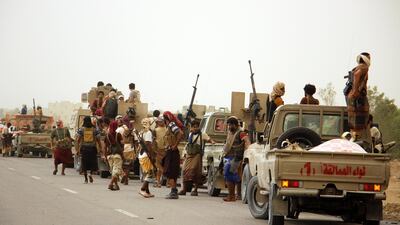On Saturday, Yemeni forces backed by the Saudi-led Arab coalition seized control of the airport in Hodeidah. The operation to take one of the Houthi rebels' strongholds marks a major milepost in the offensive launched last week to liberate Hodeidah from the Houthi rebels. For four days, about 25,000 Yemeni fighters loyal to the government, led and supported by the Saudi-led coalition, have swept through the Red Sea port city.
The push for the airport was executed in such a way as to minimise damage to the infrastructure – preserving the buildings and runways was an explicit goal of the coalition – and it appears largely to have succeeded in that endeavour as the task of liberating Yemen moves a step closer. Hodeidah – known as the "mouth of Yemen" – is the gateway for aid, food imports and other crucial supplies into Yemen. In the hands of the Houthis – who used it to smuggle arms into the country and imposed illegal taxes on commercial ships to finance their rule – it was used as a weapon of torture for Yemen's desperate citizens as they were held to ransom over basic necessities. The end of their reign of terror just edged closer. Aid supplies from the UAE are already on their way to Hodeidah from the Emirates Red Crescent via air and sea. Ten ships carrying 13,500 tonnes of food will soon alleviate the suffering of Yemenis while flights have been packed with more than 10,000 food parcels. The humanitarian relief must be sustained as part of a long-term strategy to lift Yemenis from starvation and poverty. There is much work to be done; this is an important step in restoring their dignity and ending hardships inflicted by a three-year siege by an illegitimate force.
UN special envoy Martin Griffiths, meanwhile, landed in Sanaa to persuade the Iran-backed Houthis to relinquish any vestiges of their grip on Hodeidah. The rebels are not expected to give up their stranglehold easily. They have met any previous attempts at diplomacy with aggression and calls for peace with missiles. As Dr Anwar Gargash, the UAE’s Minister of State for Foreign Affairs, tweeted, liberating Hodeidah “means that the Houthis will no longer be able to impose their will at the barrel of a gun”. The post-liberation challenge in Hodeidah will be to revitalise a port city that was once a centre of maritime commerce.
Defeating the Houthis is only the beginning of the end. But as anticipated by the Arab coalition, there is already movement in the right direction. If a conflict that appeared interminable a week ago is inching, however slowly, in the direction of a resolution, it is because of an intervention that aims, eventually, to restore Yemen’s legitimate government to its seat of power in Sanaa.

